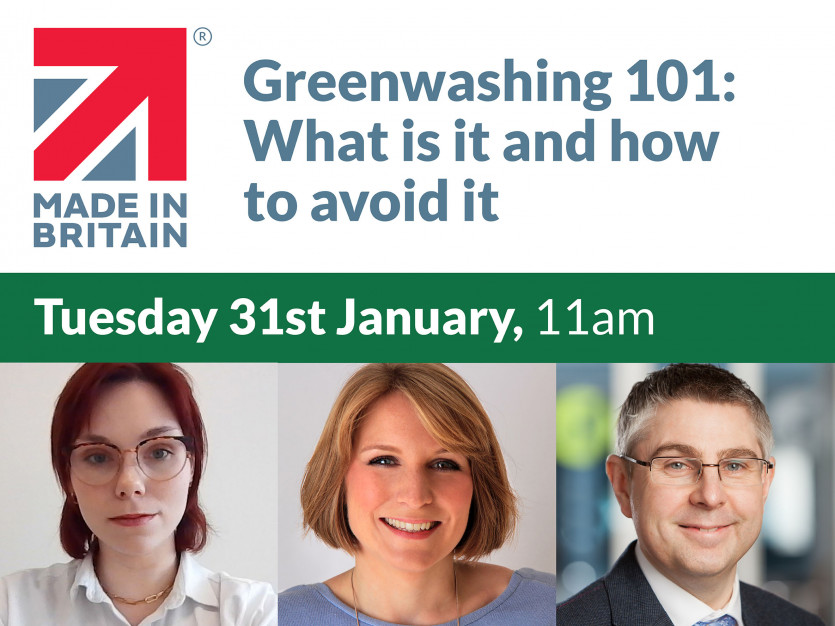Last week, the Sustainability Matters webinar series kicked off for 2023, with an overview of greenwashing and how to make better sustainability based claims. We were joined by Professor Chris Harrop OBE, ESG Strategy Director at Marshalls, Visiting Professor in Sustainable Business at University of Huddersfield and Chair of Made in Britain and Sarah George, Senior Reporter at edie.net.
Chris opened with an explanation of the term, ‘greenwashing’, stating that it is where companies make themselves appear more environmentally friendly than they really are. He then turned to explore why greenwashing happens in the first place. We know that businesses are under increasing pressure to be more sustainable and responsible, and it’s easy to fall into the trap of exaggerating some claims. In fact, a recent CMA report found that 40% of website environmental claims were misleading. There are a host of reasons why people greenwash, most of which are based around lack of understanding or knowledge, rather than malice or deliberate misleading.
So, what counts as greenwash?
Chris captured seven ‘sins’ of greenwashing, including lack of any proof of the claim, claims that are vague, advertising only a small set of attributes and failing to capture the whole picture, and outright lying.
There are also different types of greenwash, including the flipside, greenhushing, where brands under report or hide their sustainability efforts to avoid scrutiny. Other common types according to Planet Tracker include greenrinsing – altering targets to ensure they are met – and greenshifting – where companies imply that the consumer is at fault.
How can I avoid greenwashing?
Chris ended with advice to consult the Green Claims code, developed by the CMA to check that claims meet legislative requirements.
The Good and the less good
Sarah George explored a handful of greenwashing examples to bring the discussion to life. They included examples from Persil, whose tagline stated, “Tough on stains, kinder to the planet.” Consumers complained to the ASA, who removed the ad from TV and online channels, stating that the campaign doesn’t explain how the full life cycle of the product is more sustainable that its predecessors or competitors. In other words, it’s too vague and one-dimensional.
A second example focused on HSBC, whose campaign tagline read, “Climate change doesn’t do borders.” The ASA removed the ads on the grounds that the campaign deliberately excluded fossil fuel finance, to highlight smaller pieces of finance going to tree planting and low carbon technologies. The campaign misses key information that will help consumers make full and rounded decisions.
Lastly, we ended with some examples of good sustainability communications, including from Tony’s Chocolonely. The brand is committed to eliminating slavery in the cocoa supply chain, across the whole industry. In their annual report, they have addressed the question head on, stating that they have found a specific number of cases of child labour, and have tackled a significant percentage of those. By being open and transparent, Tony’s builds trust among audiences, and communicates to their competitors that by being honest about supply chain issues, the industry can work to solve and eliminate slavery for good.
Questions from the audience
Following the presentations, participants asked speakers about how to select credible partners to work with, regarding labelling for example. The response from the speakers is to do your homework. Check to understand what NGOs think of that organisation and whether others in your sector have used them too. Then make your decision.
A subsequent question explored how businesses should measure impact of supply chain, especially when parts are sourced from China and there is a lack of information. The response was to be honest. Find out what you can, and commit to finding out more. Share what you know, and what you don’t.
You can access both presentations below:
You can also watch the webinar in full in the Members' area. Sustainability Matters webinar series is part of Made in Britain’s Green Growth Programme.
The Green Growth Assessment and Programme are designed to help every manufacturer become more sustainable, by understanding their progress and then taking concrete steps to improve. The service is free to all Made in Britain members via their Members Profile in the Members' area.
If you’d like to find out more on greenwashing, you can join edie 23, Leadership Through Crisis, running from 1st-2nd March in London, where there will be a briefing and Q&A: Greenwash vs Greenhush: Striking the right balance with your sustainability comms. You can sign up here.
By Made in Britain 2 years ago | By Made in Britain
